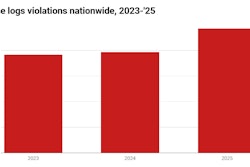Trucking news and briefs for Wednesday, April 19, 2023:
Diesel prices rise for first time in months
A 10-week run of declines for the national diesel average came to an end during the week ending April 17, as prices ticked up a small amount -- 1.8 cents.
According to the Energy Information Administration, the U.S.’ national average for a gallon of on-highway diesel is now $4.12. Prices are nearly a dollar below the same week a year ago.
During the most recent week, price changes were mixed across the country, with five regions seeing price increases and four seeing declines. The most significant increase was in the Midwest (plus 5.9 cents), and the largest decline was in New England, where prices fell by 2.8 cents.
The nation’s most expensive diesel is in California at $4.96 per gallon, followed by New England at $4.54.
The cheapest fuel is in the Gulf Coast region at $3.88 per gallon, followed by the Midwest region at $4.03.
[Related: Why is diesel getting so much more expensive than gasoline?]
Prices in other regions, according to EIA:
- Central Atlantic -- $4.49
- Lower Atlantic -- $4.06
- Rocky Mountain -- $4.10
- West Coast less California -- $4.46
ProMiles’ numbers during the same week saw fuel prices remain flat at $4.21 per gallon.
According to the ProMiles Fuel Surcharge Index, the most expensive diesel can be found in California at $5.34 per gallon, and the cheapest can be found in the Gulf Coast region at $3.82.

FMCSA denies propane haulers’ HOS exemption request
A petition from the National Propane Gas Association (NPGA) seeking waivers from several provisions in the hours-of-service regulations has been denied by the Federal Motor Carrier Safety Administration.
NGPA asked FMCSA to allow its drivers to extend their 14-hour duty period to no more than 17 hours; to extend the 11-hour driving period to no more than 14 hours, following 10 consecutive hours off-duty; to waive the 60- and 70-hour rules for a period of no more than six consecutive days; and to allow a period of six consecutive days to end with the beginning of an off-duty period of 34 or more consecutive hours.
The group said that, because of various consumer needs, long- and short-haul propane drivers often reach the maximum operating HOS limits within three or four days, and subsequently, companies experience reductions in available drivers while consumer demand continues.
In its denial, FMCSA said “NPGA’s application does not provide an analysis of the safety impacts the requested exemption from the HOS regulations may cause,” adding that it “does not provide countermeasures to ensure that the exemption would likely achieve a level of safety” equal to or greater than current regulations.
[Related: Rolling the 14: How to pull off the new 7/3 split-sleeper in the hours of service]
Interstate Health announces first two locations
Interstate Health, geared to provide health-care access to truck drivers, announced the locations of its first two clinics in Port Wentworth, Georgia, and Cookeville, Tennessee.
The Port Wentworth location, just outside Savannah, broke ground March 31 and is anticipated to open later this year. The Cookeville clinic, between Nashville and Knoxville, is the current Occupational Health Center, LLC, and joined Interstate Health effective April 1.
The company said both locations are strategically situated in areas frequented by commercial drivers, aligning with the company’s mission to make health care more accessible.
Said Jeff Seraphine, CEO of Interstate Health, “We anticipate that these two locations alone will serve thousands of drivers annually and are eager to watch that impact grow as we work to build a nationwide network of clinics over the next few years.”
Each location will initially offer primary and urgent care services for commercial drivers and the community, as well as x-ray services and DOT physicals, drug screens and other pre-employment medical care.
Future services could include include a laboratory and pharmacy, as well as sleep studies. The company also has a master technology plan to integrate with trucking company platforms and effectively utilize data to enhance continuity of care and patient convenience.
The 2,100-square-foot Georgia facility is at the Port Fuel Center located on the corner of Grange Road and Georgia Highway 21 near I-95.
The Occupational Health Center in Cookeville, Tennessee, is a 5,300-square-foot clinic for primary and urgent care, likewise occupational medicine. As part of Interstate Health, OHC providers and staff will continue to serve their current patients and community, while also serving commercial truck drivers along I-40.









